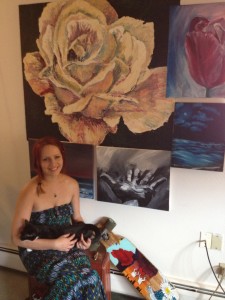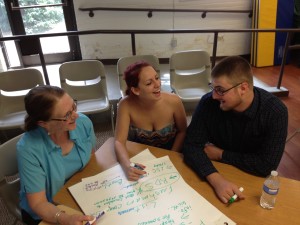Story by Cynthia Tate
When Dani Cole was just 15 years old, she wrote her last will and testament and prepared for a high-risk brain surgery with hopes of alleviating the repercussions of a rare brain condition called Chiari 1 malformation, a condition that prevents cerebrospinal fluid from flowing freely from the lower part of the brain into the spinal canal.

“It caused extreme fatigue, extreme balance issues, extreme migraines,” Cole explained. “I’d be walking and I would walk into a wall. That was my seventh grade year. In eighth grade I was diagnosed with epilepsy, in ninth grade anemia and the next year was arthritis.”
In 10th grade, Cole’s doctors presented her with a surgical option that offered the potential for alleviating some of the symptoms of her condition, but it involved risk: a 50/50 chance of survival. She didn’t hesitate to give an affirmative reply. The procedure was successful to an extent, but left her with residual symptoms, including extreme memory and fatigue issues.
Her years in junior high and high school were riddled with visits to the hospital, often with extended stays.
“They didn’t think I would graduate [from] high school, no one thought that — my doctors, my teachers, my mother,” she said. “Everyone around me came to the conclusion that I would have a different life than other people, that I would be limited.”
Art history major
She was determined to prove them wrong, and she has. Today, she is a senior CSU student majoring in art history. Upon being accepted to CSU, she recalls feeling elated.
“I had this chance, this opportunity to mean something and do something with my life and I could do this,” she said.
Cole explained that when she first considered the prospect of higher education, her fears weren’t about typical things like how hard will classes be or getting along with a dorm roommate; but rather more survivalistic. She worried about the raw basics such as getting through class without falling asleep, remembering to go to class and enduring physical pain while trying to maintain focus on lectures.
While the transition from high school to college is tough for many students, it is even more so for the student who is faced with unique challenges that pose major obstacles to fully participating in academic and campus life. To level the playing field for students like Cole, the Center for Community Partnerships in the Department of Occupational Therapy developed a support program called Opportunities for Postsecondary Success (OPS). Cole was one of the first students to participate in the program. The program offers an array of individualized, holistic services that cater to the specific needs of each student. OPS coordinators and mentors work one-on-one with students helping them identify barriers and find strategies, tools and resources that diminish or eliminate those barriers. Cole attributes her success, in part, to the campus support provided through the OPS program as well as the Resources for Disabled Student Services office.
Campus resources
In discussing support on campus for students with unique challenges, Cole refers to the critical role that Resources for Disabled Students plays, but she also has come to realize that it’s just not enough for some students.
“The OPS program was everything that I needed coming into school. It has been invaluable to me,” she said. “My OPS mentor provided an individualized plan that made it easier for me. This was really important because my challenges and related needs are specific to my brain condition.”
 She feels that the value of individualized identification of needs, planning, and provision of support for students with diverse challenges cannot be overstated when it comes to succeeding in higher education.
She feels that the value of individualized identification of needs, planning, and provision of support for students with diverse challenges cannot be overstated when it comes to succeeding in higher education.
When asked what she would say to others who face similar challenges and are considering CSU, Cole replied, “I’d say get involved with the supports, the things that you need, the opportunity to use OPS and RDS.”
“Don’t be afraid to ask for help, use the resources and supports that are available,” she advises, and she doesn’t underestimate the importance of learning self-advocacy skills. “There’s all of these different obstacles every single day [for me], and without support systems in place it can be really challenging, so if you have the support systems in place, things sort of get more manageable and you’re able to get through it. You can get swallowed up really quickly if you don’t have supports in place. They [OPS and other campus resources] raise the level so that way you’re able to achieve everything another student would be able to.”
The future
And what she envisions for her future?
“When I was diagnosed I wasn’t really able to think of the future,” she said. “They told me never to really think past six months and that sort of hit me really hard throughout high school. Now it’s a lot easier to think of an actual future for myself. My dream is to become a curator.”
Cole continued, “With everything that I’ve gone through, it’s just the fact that I could actually get a degree and in something I love! I had this chance, I just was so determined, with all the help that I received it made it so a way was possible.”
Cole currently holds an internship position as art director for the Journal of Undergraduate Research and Scholarly Excellence and is the president of a campus-based brain injury support group. As graduation approaches, she looks forward to an exciting and meaningful future. Yes, she continues to face daily challenges, ones that most of us can’t imagine, but things are a little easier now that she feels equipped to find and get support when needed and is able to apply strategies that have proven successful for her situation.
For more information about OPS visit http://ccp.colostate.edu or send an email message to contactccp@colostate.edu. For information about the CSU Brain Injury Support Group email csubraininjurygroup@gmail.com. To contact Resources for Disabled Students, call (970) 491-6385.